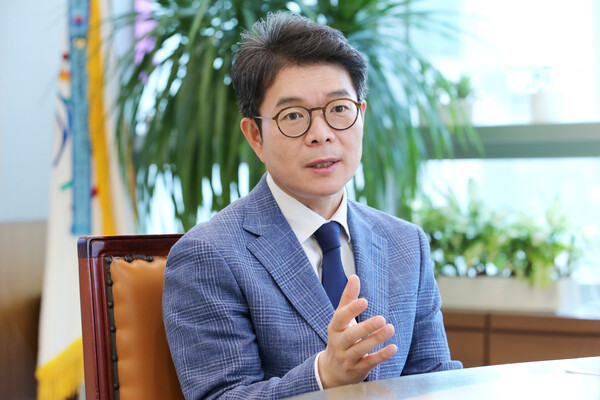
Chong Won-o, an alumnus of Hanyang University (HYU) and Mayor of Seongdong-gu, embarked on his political journey in 1995 at the youthful age of 28. Under his leadership, Seongdong-gu has undergone a remarkable transformation in infrastructure and residents’ quality of life, gaining recognition for its innovative urban policies. His popularity is further attested by his three consecutive reappointments as mayor.
Chong’s most notable election was an astounding 69.5 percent in 2018, marking the highest vote share in Seoul. In addition to his political career, Chong Won-o pursued his master’s and doctoral studies at HYU’s Graduate School of Public Policy and Graduate School of Urban Studies. He is also a published author in the fields of sociology and urban planning.
2023 was Chong Won-o’s 10th anniversary as a District Chief of Seongdong-gu. The Hanyang Journal (HJ) had the privilege of interviewing him, providing insight into the professional dedication and driving forces behind his continued work.
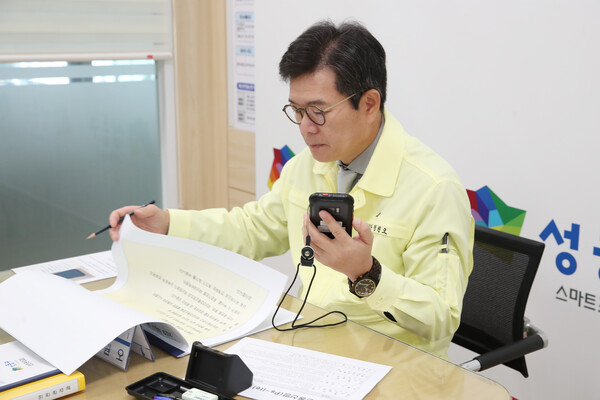
# From a Rookie Politician to “Seoul’s Most Votes Elected”
Q. What is the charm of being Seongdong’s mayor?
A. I believe the allure of local governance lies in the power to spark national change through modest beginnings. Even a decade into my tenure, this conviction remains steadfast. For example, when a local government successfully introduces a new policy that garners national recognition, it sets in motion a wave of consensus on its significance. Notably, Seongdong-gu’s ‘Essential Workers Ordinance’ and ‘Gentrification Prevention Ordinance’ have been legislated as the ‘Essential Workers Protection Act’ and the ‘Regional Commercial Rights Act,’ respectively.
Q. How do you promote ‘life-friendly policies’ across so many different fields?
A. Many of our policies stem from resident proposals. For instance, recurring complaints about the scarcity of knife sharpening and umbrella repair services, once prevalent but now difficult to find, led to the creation of a ‘visiting knife sharpening and umbrella repair service’ offered twice a year. This policy has been proven to be highly popular, attracting 40 to 50 visitors daily during its operation.
Q. How do you handle conflicts arising from your administrative work?
A. Typically, new policies are implemented through majority votes. However, I advocate for the persuasion process, aiming for near-unanimous agreement even if it takes time. The ‘Geumho-dong Market Road Expansion’ project, completed in March last year, is a notable example. While many residents initially supported the project, there were significant objections. Yet, through patient persuasion, we successfully overcame these obstacles.
Due to diverse interests and complexities, ensuring conflicts is inherent to the administrative process. Nonetheless, I approach these conflicts with patience, listening carefully to steer policies toward a consensus that satisfies as many parties as possible. Extensive research and study help me propose the best possible alternatives.
Q. What are your primary concerns these days?
A. My paramount concern is the increasing frequency of crimes motivated by abnormal intentions, which threatens the peace and safety of our residents. These unpredictable motives are challenging to anticipate, but we have implemented a crime prevention system to swiftly share on-site images with relevant personnel during emergencies. In Seongdonggu, we have a system that allows quick information sharing between the CCTV monitoring center, the fire station, and the police station in case of an emergency. This initiative aims to create a safe living environment and promptly address safetyrelated issues.
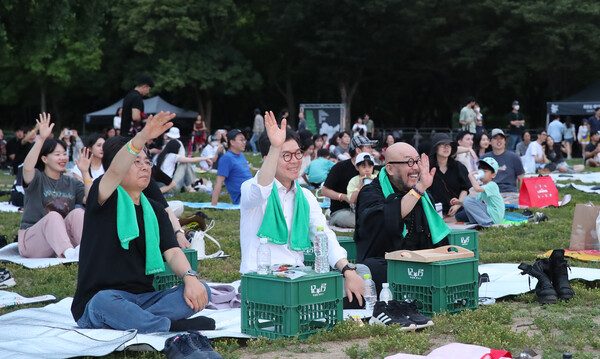
# A Popular Social Media Service Star, Mayor!
Q. What inspired your active and engaging communication approach?
A. I consider residents’ complaints as indicators of their needs, not just problems to solve. By genuinely listening to residents’ candid opinions through various Social Media Service (SNS) platforms like blogs, Twitter, and Facebook, I can craft policies that resonate with their daily lives. Sometimes suggestions have been submitted through text messages since 2014. Therefore, I have officially provided my personal mobile phone number to receive direct feedback from residents since 2018.
Q. Maintaining this direct communication must be challenging.
A. Communication ranks among the most pivotal duties of a local leader. Text messages and SNS serve as swift, locationindependent channels to understand residents’ thoughts. Active use of these mediums comes naturally for a district chief. One-to-one communication also allows me to help the residents more closely. I once received a text message from a despondent young man struggling to secure a job. My thoughtful response buoyed him up, highlighting the transformative power of genuinely listening to people.
Q. Were there any challenges in preserving your distinctive communication style through SNS?
A. Choosing to communicate with youths via SNS requires understanding their culture. I seek advice from young employees and strive to keep abreast of relevant articles and materials. I am also particularly cautious with my language, as attempts at humor can sometimes lead to negative perceptions regarding the socially weak and alienated.
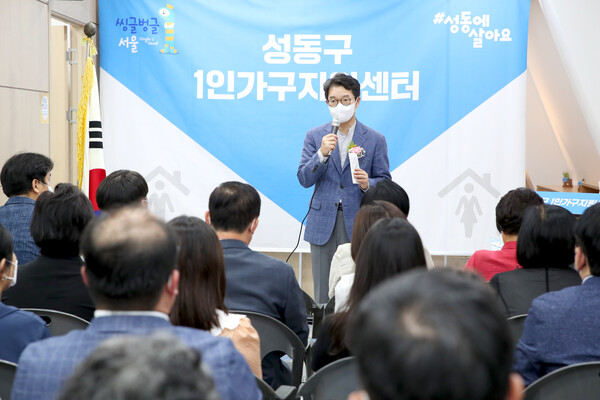
# “Chong Won-o” at HYU
Q. What inspired your entry into politics?
A. During my studies at the University of Seoul, books such as The People and an Intellectual (1989) and A Single Spark (1983) ignited my passion to assist the weak and contribute to the local community. Simultaneously, I took a leadership role in the student movement in 1989, serving as the acting president of the student council. My motivation for entering politics aligns closely with the reasons I engaged in protests.
Q. How has your background at HYU influenced your administrative work?
A. Urban planning is a crucial aspect of a mayor’s role. Since assuming the position in 2014, I have explored urban studies, particularly while advocating gentrification prevention policies. To further my understanding, I enrolled at HYU. My graduate studies enabled me to grasp the challenges faced by major cities all over the world, such as Tokyo and Singapore. This knowledge informed me of the importance of well-planned and sustainable city visions and plans.
Q. Any special memories from your time at HYU?
A. Embracing the life of a lifelong learner was a significant experience. Despite occasional regrets about exams, assignments, and reports amid a hectic schedule, the knowledge that I acquired at HYU has profoundly benefitted me today.
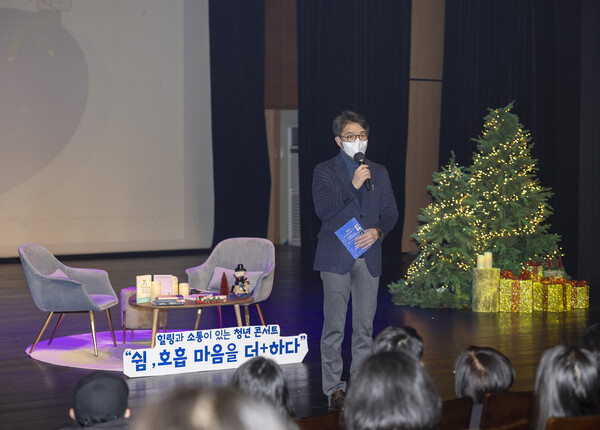
# Personal Story of Chong Won-o
Q. What does Seongdong-gu mean to you?
A. In 2014, Seongdong-gu was underdeveloped. Now, it stands as a source of pride for residents, exemplified by the trending SNS hashtag, #liveinSeongdong. I feel my own development mirrors that of Seongdong-gu.
Q. Share a moment of pride from your work.
A. The highest reward comes when residents meet on-site to express their pride in living in Seongdong. When they say, ‘I am proud to live in Seongdong’ or ‘I want to move to Seongdonggu,’ it is immensely gratifying. As residents show growing interest in local politics and Seongdong’s development, my happiness deepens.
Q. What are your future personal goals?
A. My future personal goals revolve around leading a content life with my family, free from worries. However, I have to acknowledge that my life as the head of the district is profoundly intertwined with my personal life. My other goal is to make Seongdong-gu an even more attractive place for people to live. Furthermore, as an alumnus of HYU, I aspire to be remembered as a proud member of this institution.
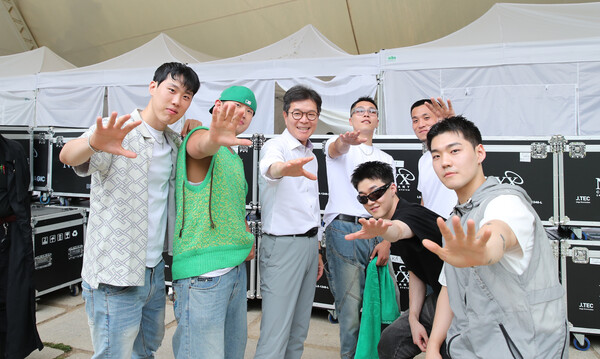
# For the Youth
Q. Are there any projects for young people that you want to promote?
A. We are committed to driving comprehensive support policies for the youth, given the complex challenges they face in various fields. Notable initiatives include the ‘Seongdong-gu Singleperson Household Support Center,’ inaugurated in August last year, dedicated to the physical and mental well-being of young individuals. We are also promoting projects supporting cultural and sports activities for active-duty soldiers and a program aimed at combating social isolation among young job seekers, which is in partnership with the Ministry of Employment and Labor. Our efforts extend to housing stability for young people and revitalizing the community, including initiatives like the ‘half-price brokerage fee service,’ support for vehicles for single-person youth households, and the operation of accommodations for young entrepreneurs. In the coming year, we are planning to provide daily necessities expenses for young people who become household heads for the first time, along with organizing a policy competition tailored to the youth.
Q. Please give a piece of advice for HYU students.
A. My advice for HYU students is ʻBelieve in your potential.’ To realize your dreams, you must cultivate the belief that they are attainable. While many of the societal challenges we confront cannot be instantly resolved, I firmly believe that collective efforts from those who aspire to create a better society will eventually overcome current difficulties. I urge young people not to lose hope but to persist in their endeavors for a brighter future.
It is also an investment and fundamental part of societal welfare to believe in the potential of our youth. I am committed to offering my support so that our young people, despite facing extraordinary challenges in these historically trying times, can lead better lives free from the constraints of a harsh reality. Thank you.

